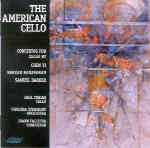This is a stunning disc, even if the title is, well, rather silly and musically not particularly on point. I won’t bore you with the details behind the commissioning of the concertos by Behzad Ranjbaran and Chen Yi, which suggest the dubious theme “connecting” the three works, particularly as the musical facts speak for themselves. I’ve never much warmed to Chen Yi’s output, which strikes me as being largely of the impersonal, atonal/ugly variety, but I have to say that this concerto has wonderful moments. She tastefully deploys expressive effects (glissandos in double notes, for example), takes the trouble to exploit the soloist’s lyrical qualities, and contrives a colorful accompaniment. At barely more than 15 tightly woven minutes, this single-movement piece doesn’t outstay its welcome even if its mood seldom varies from the determinedly grim.
By contrast, Behzad Ranjbaran’s piece is totally lovable. Its first movement began life as a sort of cross between Copland’s Lincoln Portrait and Bloch’s Schelomo, being a musical picture of Thomas Jefferson with optional narration. Happily, it works just as well without the spoken text, and Ranjbaran added the present two movements to create a marvelous–albeit stylistically traditional–piece full of good tunes, wit, a healthy dollop of sentiment, and effective exchanges between soloist and orchestra. Even the long, rhapsodic opening movement really contrives somehow to cheat the clock, maybe simply because its thematic material is so instantly appealing. It would bring the house down in concert and deserves to be widely known. Barber’s concerto, of course, is widely known, but perhaps not as widely as it should be, and this performance can only promote the cause as it’s the best one available, certainly more involving than the comparatively detached Ma/Zinman on Sony.
Indeed, cellist Paul Tobias (for whom the two newer works were written) plays sensationally throughout. He handles Barber’s mercilessly high tessitura with total confidence and generously heeds Barber’s “appassionato” directive in the finale. His account of the Ranjbaran offers tremendous enthusiasm and warmth of personality, and he preserves a beautiful, singing tone no matter what Chen Yi asks him to do. Joann Falletta leads her Virginia players in ideally paced and excellently balanced accompaniments, while the engineers put you in the best seat in the house. I am truly astonished at the wealth of fine new string concertos popping up lately, to say nothing of the superb soloists available to play them. This disc is as impressive as any–a very worthwhile acquisition even if Chen Yi’s particular brand of modernism won’t be to all tastes. [5/20/2004]
































